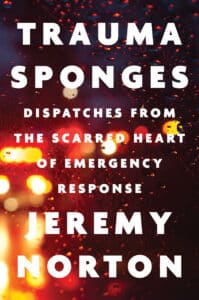Jeremy Norton, author of Trauma Sponges: Dispatches from the Scarred Heart of Emergency Response
Memoir & Creative Nonfiction Category, sponsored by Bradshaw Celebration of Life Centers
Each week leading up to the 36th annual Minnesota Book Awards, we are featuring exclusive interviews with our finalists. You can also watch the authors in conversation with their fellow category finalists here.


What is one detail you wanted to include in this book, but couldn’t find a place for?
I removed several of the pieces of what I’d intended as a panorama of emergency response, in order to make room for the more-recent and larger scope chapters on Covid, the crisis of emergency responders mis-reading people in crisis, and the sociology of badged responders & men of color.
I removed a lot of colorful vignettes about the nature and details of our work: what is happening in the streets and houses around us all.
Tell us about someone who proved instrumental to the creation of this book.
I risk sounding pompous/presumptuous, but I tried hard to anchor the book within the writing and thinking of James Baldwin. His essays from the 1960s on America’s racial hypocrisy, the cancer of racism, white fragility: these broke open my understanding of the deceit of our cultural narratives.
Secondly, I dedicated the book to my dear friend Hank Lewis, a writer and educator whose experiences as a Black American pulverized any remaining notions I might have entertained about our country being ‘over’ racism. My understanding of white America’s con came via Baldwin’s writing and Hank’s lived experiences.
Tell us about a favorite read from the past year. Why did you find it enjoyable, insightful, or memorable?
Claire Dederer’s Love and Trouble. We’re about the same age, and her deft retelling and examination of her tattered childhood and adolescence in the post-70s evoked so much of my own experiences–with the exception that she is/was reflecting on a very specific (white) female experience. And the writing FROM a position in middle age where we have achieved some of what we are told we ought, but our hearts are still relentless and hungry.
Danielle Evans’ Office of Historical Corrections was lively, sharp, inventive, and insightful. I devoured it.
Claire Vaye Watkins is a hell of a writer. Her I Love You But I’ve Chosen Darkness still haunts me–as a piece of writing and for the craft of it. Just powerful and stunning.

Please tell us something about yourself that is not widely known.
I spent several years as a ‘decoy’ for police/personal-protection dog training. The dogsports have deep roots in France and Belgium, and I served as a human sparring partner and chew toy. I learned a few key phrases in German, French, Russian, and Dutch: sit, down, come, attack, stop, jump, heel. I am pretty comfortable entering homes during work and encountering the variety of pet dogs we do. Even a goofy Golden can bite, especially when a bunch of strange firefighters are climbing in the window.
Share your thoughts about the role and value of libraries.
I think they are bastions of democracy made real: accessible, equal opportunity, centers for the (sadly, now-radical notion of) freedom of thought. Librarians are incredible resources. Libraries offer community gathering and individual sanctuary. Celeste Ng’s Our Missing Hearts paid lovely homage to the work libraries and librarians do.
Jeremy Norton has been a firefighter/EMT with the Minneapolis Fire Department since 2000. He received a bachelor’s degree from Tufts University and a master’s degree in creative writing from Boston University.

